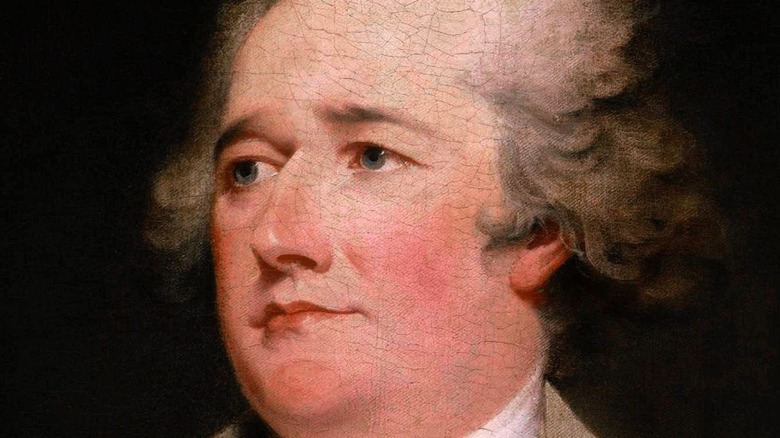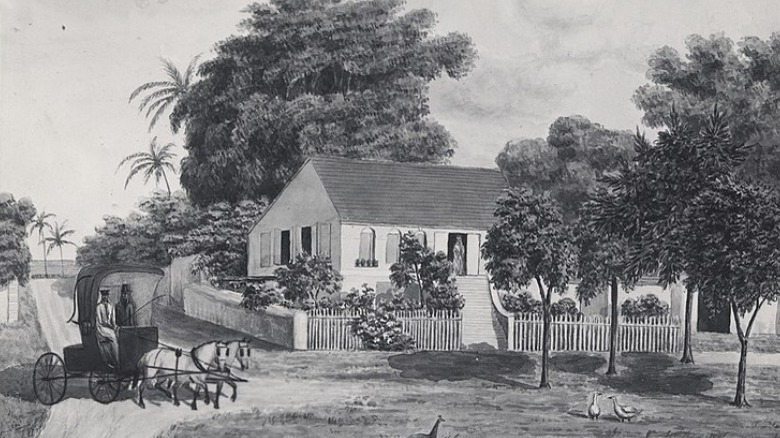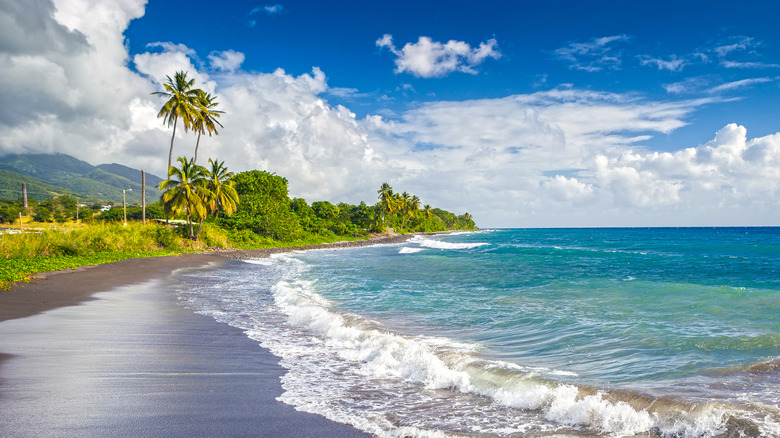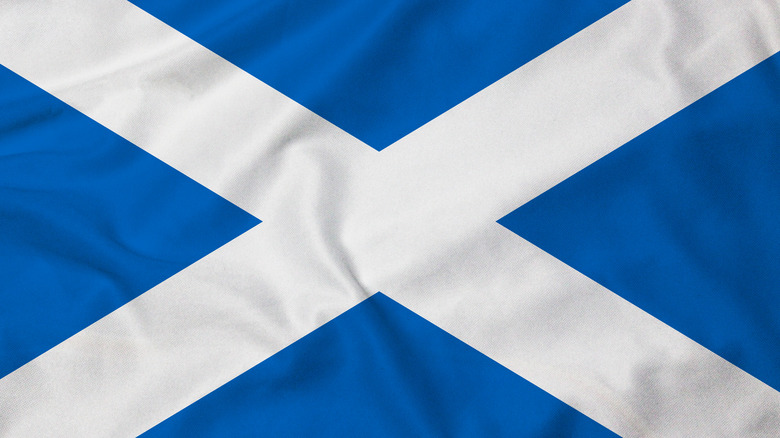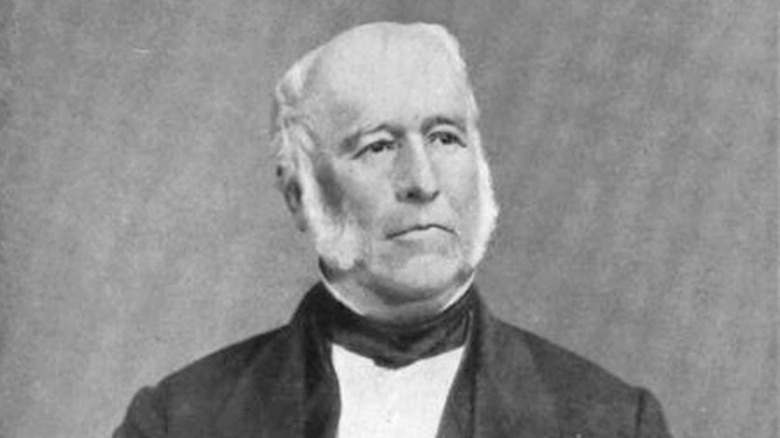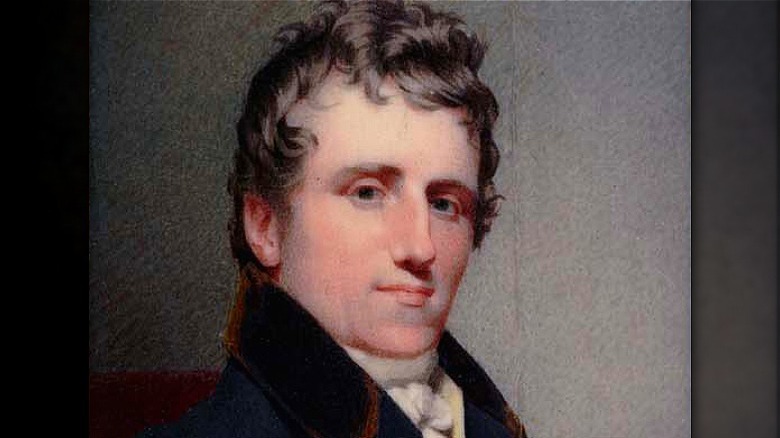Alexander Hamilton's Family Tree Explained
While once a relatively obscure historical figure to most, Alexander Hamilton has found a resurgence in notoriety and popularly because of the musical bearing his name. But while those who know the show now know the basic history of the "Ten Dollar Founding Father"— as the musical so labeled him — the details of his genealogy and family tree are less well known.
The show quickly glosses over his family history in a brief synopsis. As the lyrics to "Alexander Hamilton" by Lin-Manuel Miranda state, "How does a bastard, orphan, son of a whore, and a Scotsman, dropped in the middle of a forgotten spot in the Caribbean by providence impoverished in squalor, grow up to be a hero and a scholar?" (via All Musicals). Hamilton's parents are briefly mentioned — the same song notes his father abandoned the family when Hamilton was 10, and his mother died two years later. But many questions remain unanswered. How did his parents end up in the Caribbean, to begin with? And who were they? And where did they come from? And what happened to his family after he died? The answers are actually relatively surprising.
His mother was originally very wealthy
While Alexander Hamilton's childhood was turbulent, his mother, Rachel Fawcette, grew up in comfort and privilege. Her father, Jean Faucette, a French Huguenot doctor, emigrated in 1685 to Nevis in the British Virgin Islands after the Edict of Nantes was revoked, which had protected the religious freedom of French Protestant Huguenots (via "Alexander Hamilton"). He then changed the spelling of his name to Fawcette, WikiTree notes. He amassed significant wealth — "a snug fortune," according to Hamilton — which Rachel inherited upon his death in 1745.
Immediately after, Rachel's mother, Mary, arranged her marriage to Johann Michael Lavien, a Danish merchant, when Rachel was just 16, according to WikiTree. Hamilton called him a "fortune hunter" and said his grandmother was "captivated by the glitter" of Lavien's flashy fashion style. But he was actually deeply in debt, eventually squandering much of Rachel's fortune. She left him in 1750, and out of spite, Lavien had Rachel imprisoned for adultery. After a few months in jail, she fled to St. Kitts — leaving her son Peter behind — and met Hamilton's father, James.
When Lavien finally divorced her, Danish law prevented Rachel from remarrying (per "Alexander Hamilton"). James deserted the family in 1765, and Rachel returned to St. Croix with her sons, living at the mercy of her half-sister Ann and her husband, James Lytton. When Rachel died of a fever in 1768, her only legitimate son, Peter Lavien, inherited what little remained of her estate.
His father was a failed merchant trader
John Adams was famously famously quoted as saying Alexander Hamilton was "the bastard brat of a Scotch peddler." According to Britannica, his father, James Hamilton, born in Scotland around 1721, was indeed a "drifting trader." After an apprenticeship in Glasgow, he moved to the West Indies in 1744 to be a merchant, having seen growing trade between Scotland and the Caribbean (via Discovering Hamilton). However, he was ill-suited for the job, and by 1748, he had become bankrupt and was being supported by friends back home in Scotland.
Alexander himself described his father as someone who was "too generous and [had] too easy a temper ... [with] too much pride and too large a portion of indolence ... [but he] was otherwise without reproach and his manners those of a Gentleman" (per Discovering Hamilton). While James did abandon the family when Alexander was young, historical records suggest he left to "spar[e] [Hamilton's mother] a charge of bigamy ... after finding out that her first husband intend[ed] to divorce her under Danish law on grounds of adultery and desertion" (via WikiTree).
However, it appears that James was in touch with his sons, at least in his later years. Discovering Hamilton notes that at least in 1793, James corresponded with Alexander, and his son supported him financially in his later years. James Hamilton died in 1799 in St. Vincent in the British West Indies.
Hamilton's father was actually a member of the Scottish aristocracy
However poor he was in later years, James Hamilton was actually the son of Scottish nobility. His father was Alexander Hamilton VI of Grange, the laird of Cambuskeith, from the county of Ayrshire in Scotland (via WikiTree). Born in 1682, the elder Hamilton was the 14th laird of Cambuskeith. His wife, Elizabeth Pollock, was also gentry, born to baronet Sir Robert Pollack. James was the fourth of their six children (per "Alexander Hamilton").
Because the family had maintained detailed documentation of the family tree, they were able to trace their lineage back to the 14th century. And WikiTree quotes Alexander VI as saying, "The truth is that, on the question who my parents were, I have better pretensions than most of those who in this country plume themselves on ancestry."
Alexander Hamilton VI was titled "of Grange" after the name of the family home, the Grange. However, there were actually two Hamilton homes called "the Grange." The first was the hereditary family home in Kilmarnock, Scotland, later renamed "Kilmarnock-House," WikiTree notes. Elsewhere, Alexander's father, John, purchased Kerelaw Castle in 1655 and renamed it "the Grange" as well, and that's when the family added the use of "of Grange" to their titles (via House Histree). A new manor house was built on the property around 1787, and the renamed castle where James grew up now stands in ruins (via Discovering Hamilton).
Alexander Hamilton later also named his Harlem home "The Grange."
His children went on to varying levels of success
Alexander Hamilton and his wife, Elizabeth Schuyler, had eight children together: Philip, Angelica, Alexander Jr., James, John, William, Eliza, and a second son named Philip. The latter was nicknamed "Little Phil" and was born in 1802 after Hamilton's beloved firstborn son died in a duel on November 24, 1801 (via WikiTree). As a result of the stress from Philip's death, their second child, Angelica, had a mental breakdown from which she never recovered (per "Alexander Hamilton").
Alexander Jr. became a lawyer and fought in the War of 1812. James, also a lawyer, served as acting secretary of state to President Andrew Jackson. And Eliza cared for her mother until Elizabeth's death in 1864.
William, often called the family's "black sheep," dabbled politics with a short stint in the Wisconsin Territorial Legislature and in other smaller governmental positions, the Wisconsin State Journal reports. He also earned the rank of colonel after fighting in the Black Hawk War of 1832. Primarily a miner, he owned a number of mines in the Wisconsin area but died in 1850 of cholera during an epidemic in Sacramento, where he had relocated to take part in the Great Gold Rush.
"Little Phil" was only 3 when Hamilton died and grew up in relative poverty due to the financial challenges that occurred after his father's death. He later became a lawyer, serving as assistant U.S. attorney under his brother James. He was also an abolitionist, working with the Underground Railroad to get enslaved people to freedom (via Facebook).
It was John Church Hamilton who made the most impact
Alexander Hamilton's son John perhaps had one of the greatest hands in preserving his father's legacy, along with his mother, Eliza. A historian, he wrote a biography titled "The Life of Alexander Hamilton," though few copies remain as most were lost in a fire during binding. He curated the first collection of his father's writings in "The Works of Alexander Hamilton: Containing His Correspondence, and His Political and Official Writings, Exclusive of the Federalist," which was published in 1850-51 over seven volumes (via WikiTree). He also wrote a second comprehensive biography, "Life of Alexander Hamilton: A History of the Republic of the United States of America," at the behest of his mother, released in seven volumes between 1857 and 1864. In 1880, he donated a granite statue of his father, located in Central Park, according to the New York City Department of Parks and Recreation.
Out of Alexander Hamilton's eight children, only three had any children themselves. James had five, Philip "Little Phil" had two, and John Church again took the prize with a whopping 10 children (via WikiTree). John's oldest son, also named Alexander Hamilton, became a general during the Civil War. And following in the footsteps of his grandfather, he at one point reported directly to another president in a time of war: President Lincoln (via The New York Times).
